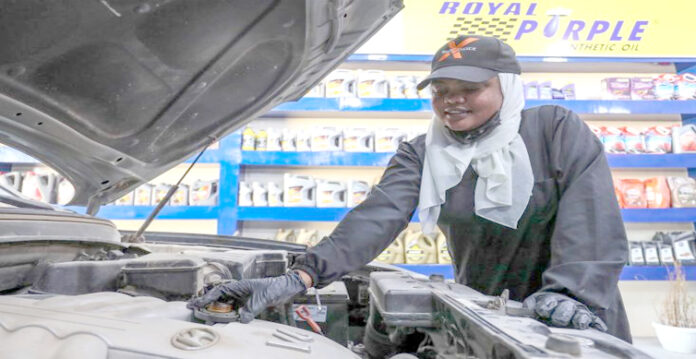In the heart of Misrata, a city located about 200 kilometers east of Tripoli, a remarkable story of resilience and determination is unfolding. Asawar Mustafa, a 22-year-old Sudanese refugee, is defying societal norms and gender expectations in a country struggling to recover from years of conflict.
Asawar, who fled the war-torn region of Sudan with her family, has taken on the role of a mechanic in a women-only section of a garage in western Libya. Despite the challenges and societal expectations that deem mechanics a predominantly male profession, Asawar’s passion and perseverance have set her apart.
The Mustafas arrived in Libya last October, fleeing the devastating conflict between the Sudanese army and the paramilitary Rapid Support Forces (RSF) that erupted in April 2023. After a harrowing journey across the desert and a series of arduous travels, Asawar and her family reached Misrata, where she eventually found employment at a local garage.
Working alongside her brother Sahabi, who also contributes to the family’s survival by working in the men’s section of the garage, Asawar has proven that her gender will not hinder her career aspirations. Despite initial fears of making mistakes and damaging customers’ vehicles, her dedication to her craft has transformed those fears into a deep-seated passion for mechanics.
Asawar’s story resonates beyond her individual achievements. In a country where traditional gender roles often confine women to domestic spheres, her presence in the workshop challenges long-held stereotypes. She has faced derogatory comments suggesting that her place is “at home” or “in the kitchen,” yet these criticisms have only fueled her determination.
The garage, owned by Abdelsalam Shagib, is notable for offering specialized services to female clients and being the first in the region to have a female mechanic on staff. Shagib, who supports Asawar’s role, believes that diversifying the workforce and welcoming women into traditionally male-dominated fields is crucial for societal progress. He has emphasized that women have a rightful place in all professions, including mechanics.
For many female drivers in Misrata, Asawar’s presence offers a sense of comfort and empowerment. As Fawzia Manita, one of her customers, stated, “It’s great to see women making inroads in all fields,” highlighting how Asawar’s work is contributing to a broader cultural shift.
Libya, still reeling from the aftermath of the 2011 NATO-backed uprising and subsequent instability, is also a key transit point for migrants and refugees seeking to reach Europe. The country’s struggle with internal chaos and undocumented foreign nationals underscores the challenges faced by newcomers like the Mustafas.
In a broader context, Asawar’s story is emblematic of the struggles and triumphs of women breaking barriers in challenging environments. According to the World Bank, women made up 37 percent of the labor force in Libya in 2022, reflecting a growing but still limited presence in various professional fields.
Asawar’s journey from Sudan to Libya and her subsequent success in a male-dominated profession underscore the strength and resilience of individuals who, despite numerous obstacles, continue to pursue their dreams and redefine societal expectations. Her story serves as an inspiring reminder that determination and passion can overcome even the most entrenched barriers.
(This story is sourced from a third-party syndicated feed. Raavi Media takes no responsibility or liability of any nature. Raavi Media management/ythisnews.com can alter or delete the content without notice for any reason.)


